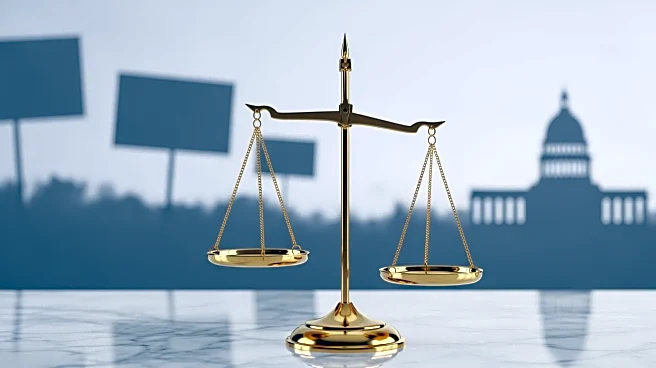What's Happening?
President Trump's approval ratings have reached a historic low during his second term, according to recent polls. An Economist/YouGov poll conducted from October 24-27, 2025, shows his approval rating at 39%,
with a disapproval rate of 58%, resulting in a net approval of -19 points. This marks the lowest point of his second term. The poll also highlights growing approval for the 'No Kings' protests, which have gained traction since their inception in June. Meanwhile, a Reuters/Ipsos poll released on October 28, 2025, indicates a 40% approval rating for Trump, a slight decrease from the previous week's 42%. The ongoing government shutdown, now the second-longest in U.S. history, has contributed to public frustration, with 50% of Americans expressing frustration and 20% feeling angry about the situation.
Why It's Important?
The decline in President Trump's approval ratings reflects significant public dissatisfaction with his administration's handling of key issues, including the prolonged government shutdown. This discontent could have substantial implications for the political landscape, potentially affecting the Republican Party's standing in upcoming elections. The growing approval of the 'No Kings' protests suggests a rising public demand for accountability and change in governance. These developments may influence policy decisions and political strategies as the administration seeks to address public concerns and regain support. The approval ratings also provide insight into the broader political climate, highlighting divisions across demographic lines, including age, education, gender, and race.
What's Next?
As the government shutdown continues, pressure mounts on the administration to find a resolution. The public's growing frustration may prompt political leaders to expedite negotiations to end the shutdown. Additionally, the administration may need to address the concerns raised by the 'No Kings' protests to mitigate further public discontent. The upcoming months will be crucial for President Trump and his administration as they navigate these challenges and attempt to improve public perception. Political analysts will be closely monitoring any shifts in approval ratings and public sentiment, which could influence the administration's policy priorities and electoral strategies.
Beyond the Headlines
The current political climate underscores the importance of public engagement and activism in shaping government policies. The 'No Kings' protests highlight a broader cultural shift towards increased civic participation and demand for transparency in governance. This trend may lead to long-term changes in how political leaders engage with constituents and address public concerns. Additionally, the demographic breakdown of approval ratings reveals underlying societal divisions that may influence future political discourse and policy-making. Understanding these dynamics is essential for political leaders and stakeholders as they work to bridge gaps and foster a more inclusive political environment.









